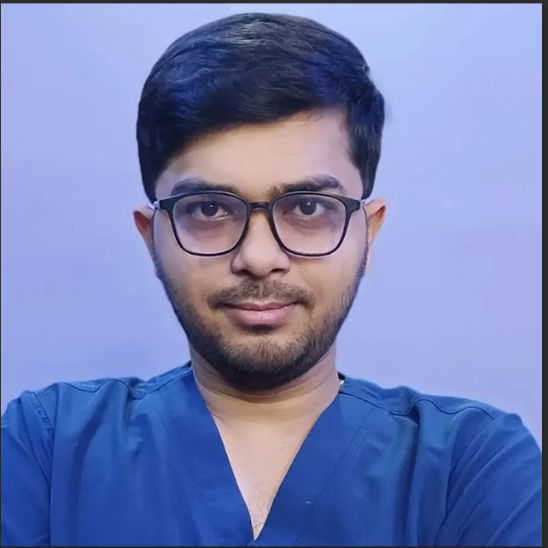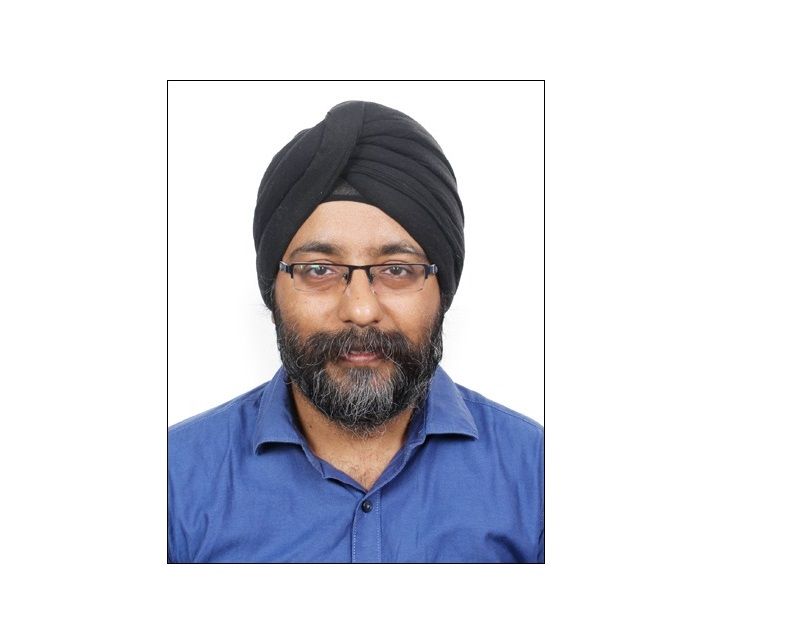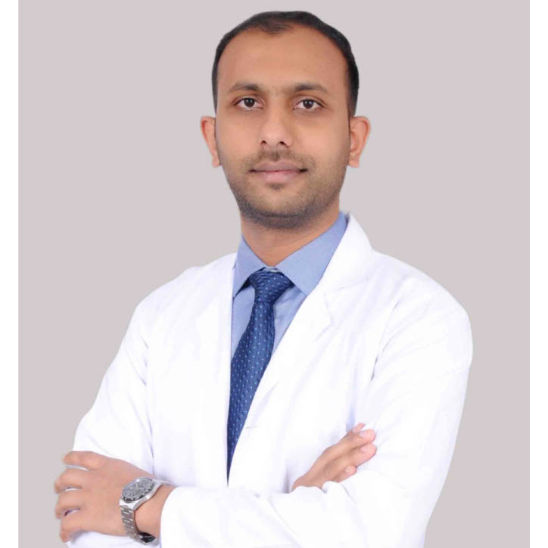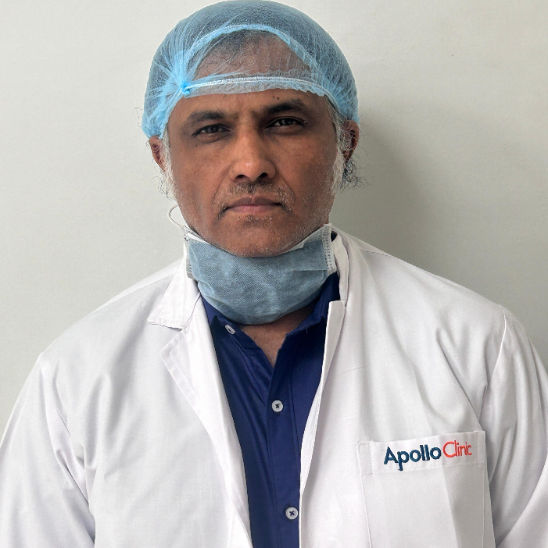Welcome User
Relevance
Consult Orthopedicians Online (537 doctors)

Dr. Rupam Chowdhury
Orthopaedician
10 Years • MBBS, DNB (Ortho.)
Kolkata
MCR SUPER SPECIALITY POLY CLINIC & PATHOLOGY, Kolkata

Dr. Gaurav Prakash
Orthopaedician
12 Years • MBBS, Diploma in Orthopaedics, DNB (Orthopaedics)
Delhi
Max Super Speciality hospital, Delhi

Dr. Keshav Digga
Orthopaedician
14 Years • MBBS, MS Orthopaedics, FIASM, FIMISS
Kolkata
DIGGA HEALTHCARE, Kolkata

Dr. Sudipta Saha
Orthopaedician
8 Years • MBBS,(D. Ortho)
Kolkata
VDC Clinic, Kolkata

Dr. Amandeep Singh Narang
Orthopaedician
11 Years • MBBS, DNB
Delhi
APOLLO FAMILY CLINIC, Delhi

Harshith
Knee Replacement Surgeon
3 Years • MBBS, MS ORTHOPEADICS, FNB ARTHROPLASTY
Bangalore
Apollo Clinic Bellandur, Bangalore
Dr.geetish
Orthodontist
6 Years • MBBS MS ORTHO
Bengaluru
Apollo Clinic, HSR Layout, Bengaluru

Dr. Biju Thomas
Orthopaedician
25 Years • MBBS, D.Ortho
Bengaluru
Apollo Clinic, Indiranagar, Bengaluru

Dr. Shrinidhi I S
Orthopaedician
10 Years • MBBS , DNB, DIP ORTHO , MNAMS
Bengaluru
Apollo Clinic, HSR Layout, Bengaluru
Dr. Manish Bajaj
Orthopaedician
24 Years • MBBS, DO (ORTHOPEDICS)
Indore
Apollo Clinic AB Road, Indore
Book Consult for Orthopaedics Online
Booking an appointment with top orthopaedic doctors is now easier than ever with Apollo 24|7. Our user-friendly platform allows you to schedule an online or in-person consultation with trusted orthopaedic surgeons at your convenience. Whether you need a knee specialist, joint specialist, or bone doctor, Apollo 24|7 has you covered. Our experienced doctors are available for online orthopaedic doctor consultations, ensuring you receive the best care from the comfort of your home. With transparent orthopaedic doctor fees and genuine orthopaedic doctor reviews, you can make an informed decision when choosing the right specialist for your needs. Book your appointment with a doctor near your location by searching the phrase orthopaedic doctors near me and take the first step towards better musculoskeletal health.
What is Orthopaedics?
Orthopaedics is a medical speciality that focuses on the diagnosis, treatment, and prevention of disorders related to the musculoskeletal system. This includes bones, joints, ligaments, tendons, muscles, and nerves. Orthopaedic doctors, also known as bone doctors, treat a wide range of conditions, such as fractures, arthritis, sports injuries, congenital deformities, and musculoskeletal tumours. The goal of orthopaedics is to restore mobility, alleviate pain, and improve the overall quality of life for patients suffering from musculoskeletal issues. As musculoskeletal disorders are common and can significantly impact an individual's daily activities, orthopaedics plays a crucial role in healthcare.
Who is an Orthopaedist?
An orthopaedic doctor is a medical professional who specialises in the diagnosis, treatment, and prevention of disorders related to the musculoskeletal system. In the Indian subcontinent, bone doctors typically complete a Doctor of Medicine (MD) or Doctor of Orthopaedic Medicine (DOMS) degree, followed by a postgraduate degree in Orthopaedic Surgery, such as a Master of Surgery (MS) in Orthopaedics. Some joint specialists may also pursue additional qualifications, like a Diplomate of National Board (DNB) in Orthopaedics. Orthopaedic surgeons play a vital role in diagnosing and treating musculoskeletal conditions through clinical evaluation, diagnostic tests, and various treatment options, including medication, physical therapy, and surgery. They also contribute to preventive healthcare by educating patients on injury prevention and promoting healthy lifestyles.
What Do Orthopaedists Do?
Orthopaedic doctors are highly skilled professionals who provide comprehensive care for patients with musculoskeletal disorders. Some of the key responsibilities of knee specialist and joint specialist include:
Conducting thorough physical examinations and ordering diagnostic tests, such as X-rays, MRIs, and CT scans, to accurately diagnose musculoskeletal conditions
Developing personalised treatment plans that may include medication, physical therapy, or surgical interventions
Performing surgical procedures, such as joint replacements, fracture repairs, and arthroscopic surgeries, to restore mobility and alleviate pain
Providing post-operative care and rehabilitation guidance to ensure optimal recovery and improved quality of life
Educating patients on injury prevention, healthy lifestyles, and ergonomic practices to maintain musculoskeletal health
What are the Other Sub-Specialities of Orthopaedics?
Orthopaedics encompasses several sub-specialities, each focusing on specific areas of the musculoskeletal system. The sub-specialities include:
Joint Replacement: This sub-speciality deals with the surgical replacement of damaged or diseased joints, such as the hip, knee, and shoulder, with artificial implants to restore mobility and alleviate pain.
Sports Medicine: Sports medicine joint specialists focus on preventing, diagnosing, and treating injuries related to athletic activities, as well as providing rehabilitation and performance-enhancement guidance for athletes.
Paediatric Orthopaedics: This sub-speciality addresses musculoskeletal disorders in children, including congenital deformities, developmental disorders, and injuries specific to the growing skeleton.
Spine Surgery: Spine orthopaedic surgeons specialise in treating disorders of the vertebral column, such as herniated discs, spinal stenosis, scoliosis, and spinal tumours, using both surgical and non-surgical approaches.
Orthopaedic Trauma: Trauma orthopaedic doctors provide emergency care and surgical treatment for patients with severe musculoskeletal injuries, such as complex fractures, dislocations, and soft tissue damage.
Foot and Ankle Surgery: The doctor for arthritis focuses on treating disorders of the foot and ankle, including bunions, heel pain, ankle instability, and arthritis, using both conservative and surgical methods.
Hand Surgery: Orthopaedic surgeons specialise in treating conditions affecting the hand, wrist, and forearm, such as carpal tunnel syndrome, trigger finger, and hand fractures, using microsurgical techniques and reconstructive procedures.
Shoulder and Elbow Surgery: This sub-speciality addresses disorders of the shoulder and elbow, including rotator cuff tears, shoulder instability, tennis elbow, and arthritis, using arthroscopic and open surgical techniques.
Musculoskeletal Oncology: Musculoskeletal oncologists specialise in diagnosing and treating benign and malignant tumours of the bones, joints, and soft tissues, often collaborating with medical and radiation oncologists to provide comprehensive cancer care.
Adult Reconstruction: Joint specialists focus on the surgical treatment of degenerative joint conditions, such as advanced arthritis, using joint replacement and osteotomy procedures to restore function and alleviate pain in adult patients.
What are the Examinations Conducted Under Orthopaedics or Tests Performed by an Orthopaedist?
Orthopaedic doctors rely on various examinations and tests to diagnose and evaluate musculoskeletal conditions accurately. Some of the most common diagnostic tools used in orthopaedics include:
Physical Examination: A thorough physical examination allows the bone doctors to assess the patient's range of motion, strength, stability, and overall musculoskeletal function.
X-rays: Plain radiographs are used to visualise bones and joints, helping to identify fractures, arthritis, and other structural abnormalities.
Magnetic Resonance Imaging (MRI): MRI scans provide detailed images of soft tissues, such as ligaments, tendons, and cartilage, enabling the detection of injuries and degenerative changes.
Computed Tomography (CT) Scans: CT scans create cross-sectional images of bones and joints, offering a more detailed view of complex fractures and bone abnormalities.
Bone Scans: Nuclear medicine bone scans help identify areas of increased bone metabolism, which can indicate fractures, infections, or tumours.
Electromyography (EMG) and Nerve Conduction Studies (NCS): These tests assess the function of muscles and nerves, helping to diagnose conditions such as carpal tunnel syndrome and peripheral neuropathy.
Arthroscopy: This minimally invasive surgical procedure allows joint specialists to visualise the inside of a joint using a small camera, enabling the diagnosis and treatment of various joint conditions.
What are the Common Conditions & Diseases that Orthopaedists Treat?
Joint specialists specialise in diagnosing and treating a wide range of musculoskeletal conditions. Some of the most common conditions and diseases they manage include:
Arthritis: Orthopaedic doctors are skilled in treating various forms of arthritis, such as osteoarthritis and rheumatoid arthritis, which cause joint pain, stiffness, and inflammation. A doctor for arthritis can develop
personalised treatment plans to alleviate symptoms and improve joint function.
Fractures: Broken bones require prompt attention from a bone doctor to ensure proper healing and prevent
complications. Orthopaedists specialise in treating both acute and stress fractures.
Sprains and Strains: These common injuries involve ligaments, muscles, or tendons and can cause pain, swelling, and limited mobility. Orthopaedic surgeons provide appropriate treatment to promote healing and restore function.
Tendonitis and Bursitis: Overuse or repetitive motions can lead to inflammation of tendons and bursae, resulting in pain and swelling. Bone doctors offer targeted therapies to reduce inflammation and promote recovery.
Spinal Conditions: Orthopaedic doctors treat a range of spinal issues, such as herniated discs, spinal stenosis, and spondylosis, which can cause back pain, numbness, and weakness in the extremities.
Sports Injuries: Athletes and active individuals often seek the expertise of knee specialists and joint specialists for the management of sports-related injuries, such as ACL tears, meniscal injuries, and rotator cuff tears.
Pediatric Orthopaedic Conditions: Bone doctors also treat musculoskeletal issues in children, including developmental disorders, congenital abnormalities, and growth-related conditions.
Reasons to See an Orthopaedist
Consulting an orthopaedic surgeon is crucial for maintaining optimal musculoskeletal health and preventing serious complications. Here are some key reasons why you should visit a bone doctor:
Persistent Pain or Discomfort: If you experience chronic pain or discomfort in your bones, joints, muscles, or tendons, it is essential to see a bone doctor for an accurate diagnosis and appropriate treatment.
Limited Mobility or Joint Stiffness: Difficulty moving a joint or experiencing stiffness can significantly impact your daily activities. A joint specialist can identify the underlying cause and provide targeted interventions to improve mobility and reduce pain.
Sports-Related Injuries: Athletes and active individuals who sustain injuries during physical activities should seek prompt care from a joint specialist to ensure proper healing and prevent future complications.
Arthritis Management: If you have been diagnosed with arthritis or experience symptoms such as joint pain, swelling, and stiffness, a doctor for arthritis can develop a comprehensive treatment plan to manage your condition effectively.
Fractures or Traumatic Injuries: In case of a suspected fracture or a traumatic injury to the musculoskeletal system, immediate evaluation by a knee specialist is crucial for proper diagnosis and treatment to promote optimal healing.
Postoperative Care: Following an orthopaedic surgery, regular follow-up visits with your orthopaedic surgeon are essential to monitor your recovery, address any concerns, and ensure a smooth rehabilitation process.
What Types of Procedures Do Orthopaedists Perform?
Orthopaedic doctors perform a variety of therapeutic and surgical procedures to treat musculoskeletal conditions. Some of the most common procedures include:
Joint Replacement: Orthopaedic surgeons replace damaged joints, such as hips and knees, with artificial implants to relieve pain and restore function.
Arthroscopy: This minimally invasive procedure uses a small camera to diagnose and treat joint problems, such as meniscal tears and ligament injuries.
Fracture Repair: Bone doctors use various techniques, like casting, plating, and intramedullary nailing, to realign and stabilise broken bones.
Spinal Fusion: This surgical procedure fuses vertebrae to treat conditions like spinal stenosis, scoliosis, and herniated discs.
ACL Reconstruction: Orthopaedic surgeons replace a torn anterior cruciate ligament (ACL) in the knee with a graft to restore stability.
Rotator Cuff Repair: Orthopaedic doctors repair torn rotator cuff tendons in the shoulder to alleviate pain and improve function.
Carpal Tunnel Release: This procedure involves cutting the transverse carpal ligament to relieve pressure on the median nerve and treat carpal tunnel syndrome.
Meniscal Repair: Knee specialists and joint specialists use arthroscopic techniques to repair torn menisci in the knee, preserving the cushioning and stability of the joint.
Bunionectomy: Orthopaedic doctors remove or realign the bony bump at the base of the big toe to treat bunions and alleviate pain.
Osteotomy: This procedure involves cutting and realigning bones to correct deformities or redistribute weight-bearing forces.
Tendon Repair: Orthopaedic surgeons repair torn tendons, such as the Achilles tendon, to restore function and strength.
Laminectomy: This procedure involves removing a portion of the vertebral bone (lamina) to relieve pressure on the spinal cord or nerves.
Ganglion Cyst Removal: Orthopaedic surgeons remove these non-cancerous lumps that develop along the tendons or joints of the wrists or hands.
Cervical Disc Replacement: This procedure involves removing a damaged cervical disc and replacing it with an artificial one to alleviate pain and preserve motion.
Why Choose an Apollo 24|7 Orthopaedist?
Apollo 24|7 orthopaedic doctors are highly qualified and experienced professionals who bring the latest techniques and advancements in orthopaedic care to their patients. With expertise gained from training at top global centres, these orthopaedic surgeons offer personalised care and advanced treatment options to address a wide range of musculoskeletal conditions.
Patients can access online orthopaedic doctors consultation services, allowing them to receive expert advice and guidance from the comfort of their homes. For those preferring in-person consultations, Apollo 24|7 makes it easy to book orthopaedic doctor appointments at their convenient locations. With transparent orthopaedic doctors' fee structures and genuine orthopaedic doctors' reviews, patients can make informed decisions about their care.
What to Expect When Visiting an Orthopaedist?
When you visit a doctor for arthritis, you can expect a thorough evaluation and a personalised approach to your musculoskeletal concerns. Here's what a typical visit may involve:
Medical History Review: Your orthopaedic doctor will discuss your medical history, including any previous injuries, surgeries, or relevant conditions, to gain a comprehensive understanding of your health background.
Physical Examination: The orthopaedic surgeon will conduct a detailed physical examination, assessing your range of motion, strength, flexibility, and any areas of pain or tenderness.
Diagnostic Imaging: Depending on your condition, your bone doctor may order diagnostic tests such as X-rays, MRI, or CT scans to visualise the affected area and aid in diagnosis.
Discussion of Treatment Options: Based on the evaluation and diagnosis, your joint specialist will discuss various treatment options with you, including conservative measures like physical therapy and medications, as well as surgical interventions if necessary.
Personalised Treatment Plan: Your knee specialist will develop a customised treatment plan tailored to your specific needs, goals, and lifestyle, ensuring optimal outcomes and recovery.
Follow-up Care: Regular follow-up visits will be scheduled to monitor your progress, adjust treatment as needed, and address any concerns or questions you may have throughout your recovery journey.
How Can I Get an Appointment With an Orthopaedist?
Booking an appointment with an orthopaedic doctor at Apollo 24|7 is a simple and convenient process:
Online Booking: Visit the Apollo 24|7 website and navigate to the "Orthopaedics" speciality page. Browse through the list of orthopaedic doctors, read their profiles, and check orthopaedic doctors' reviews. You can search for a doctor near your location by searching for the phrase orthopaedic doctors near me.
App Booking: Download the Apollo 24|7 app on your smartphone. Log in or create an account, then search for "Orthopaedics" in the speciality section. Select your preferred orthopaedic surgeon, view their profile, and book an online orthopaedic doctor consultation by choosing a suitable date and time for your appointment.
In-Clinic Booking: You can also visit your nearest Apollo clinic and request an appointment with an orthopaedic surgeon. The reception staff will assist you in scheduling a consultation based on the doctor's availability.
FAQs
What is orthopaedics?
Orthopaedics is a medical speciality focusing on the diagnosis, treatment, and prevention of injuries and diseases related to the musculoskeletal system, which includes bones, joints, muscles, tendons, and ligaments. Orthopaedic doctors specialise in this field to help patients maintain optimal musculoskeletal health and function.
What conditions do orthopaedic doctors treat?
Orthopaedic doctors treat a wide range of conditions affecting the musculoskeletal system, such as fractures, sprains, strains, arthritis, spine disorders, sports injuries, and congenital abnormalities. They also provide care for chronic conditions like osteoarthritis and rheumatoid arthritis, as well as acute injuries resulting from accidents or overuse.
When should I consult an orthopaedic doctor?
You should consult an orthopaedic doctor if you experience persistent pain, stiffness, or limited mobility in your joints, bones, or muscles. This is particularly important if you have recently suffered an injury, have a chronic condition that is worsening, or find it difficult to perform daily activities like walking or lifting objects.
What can I expect during my first orthopaedic consultation?
During your initial consultation, the orthopaedic surgeon will ask about your symptoms, medical history, and current medications. They will perform a physical examination and may order imaging tests such as X-rays, MRI, or CT scans to better understand your condition. Based on the findings, they will discuss treatment options with you.
What are the most common orthopaedic injuries?
Common orthopaedic injuries include fractures (broken bones), sprains and strains of ligaments and muscles, rotator cuff injuries, anterior cruciate ligament (ACL) tears, and tendonitis. These injuries often result from falls, sports activities, overuse, or accidents. Knee specialists and joint specialists are well-equipped to diagnose and treat these conditions using both surgical and non-surgical approaches.
How can I manage chronic pain caused by an orthopaedic condition?
Chronic pain from orthopaedic conditions can be managed through a combination of methods, such as taking prescribed medications, participating in physical therapy, using heat or cold therapy, and practising relaxation techniques like meditation or deep breathing exercises. Your orthopaedic doctor will work with you to develop a personalised pain management plan.
What is arthroscopic surgery?
Arthroscopic surgery is a minimally invasive procedure performed by orthopaedic surgeons. It involves making small incisions near the affected joint and inserting an arthroscope (a thin, flexible tube with a camera and light) to visualise the joint's interior. This allows the surgeon to diagnose and treat joint problems with greater precision and faster recovery times.
What advanced procedures do orthopaedic surgeons perform?
Orthopaedic surgeons perform various advanced procedures, such as joint replacement surgery (replacing damaged joints with prosthetic implants), spinal fusion (joining vertebrae to stabilise the spine), and arthroscopic surgeries for ligament repairs or cartilage restoration. They also use cutting-edge techniques like computer-assisted navigation and robotic surgery to enhance precision and patient outcomes.
How can I find the best orthopaedic doctor near me?
To find the best doctor near your location, search for the phrase orthopaedic doctor near me. You can also start by asking for referrals from your primary care physician or family and friends who have had positive experiences with orthopaedic doctors. Research the doctors' credentials, experience, and orthopaedic doctors' reviews online.
What factors should I consider when choosing an orthopaedic doctor?
When choosing an orthopaedic doctor, consider their qualifications, experience, and expertise in treating your specific condition. Look for orthopaedic surgeons who are board-certified, have a good reputation, and offer a patient-centric approach. Additionally, factors like the orthopaedic doctor's fees, location, and availability for online consultations can help you make an informed decision.